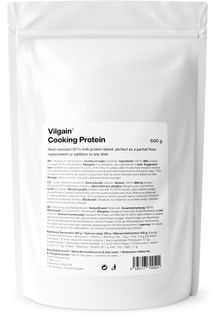- Almonds (2)
- Apple (3)
- Banana (17)
- Blueberry (4)
- Brownie (3)
- Caramel (11)
- Chocolate (38)
- Cinnamon (5)
- Coconut (3)
- Coffee (5)
- Cookie (5)
- Cranberry (1)
- Hazelnuts (9)
- Honey (1)
- Lemon (2)
- Mango (3)
- Marzipan (2)
- Orange (2)
- Peach (3)
- Peanut butter (6)
- Pistachio (1)
- Raspberry (2)
- Salted caramel (13)
- Strawberry (21)
- Tea (1)
- Tropical fruit (1)
- Vanilla (22)
- Walnuts (1)
- White chocolate (6)
- Without flavor (8)


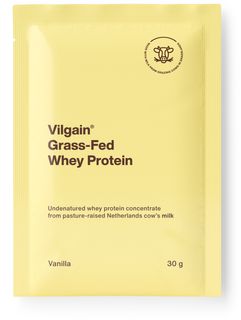
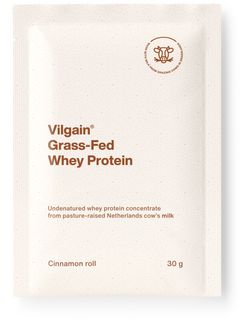
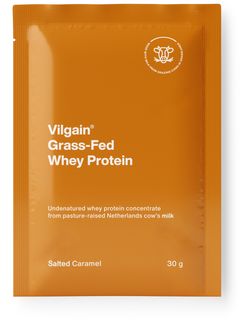
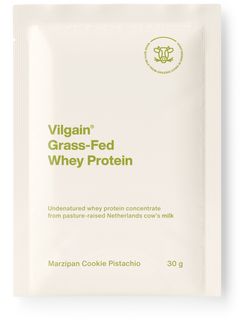
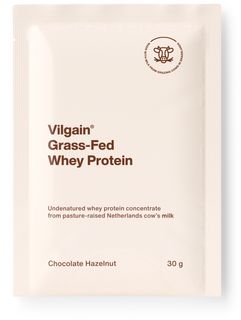


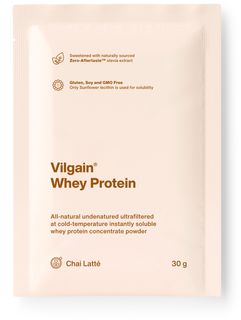
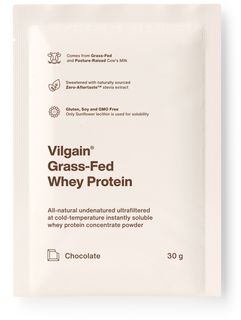

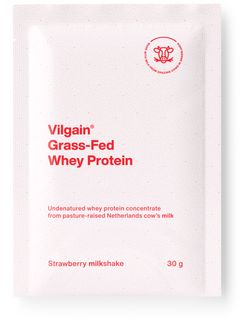
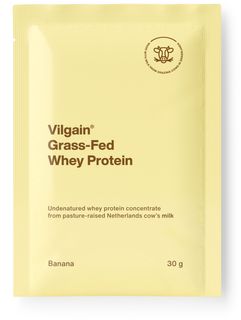



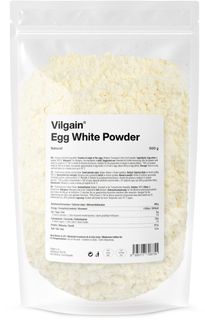
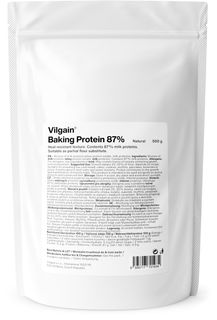
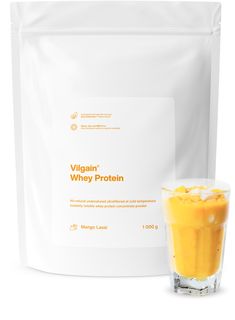
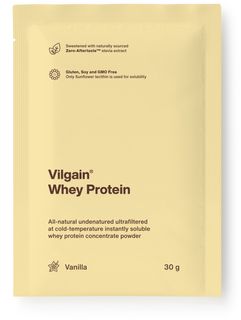

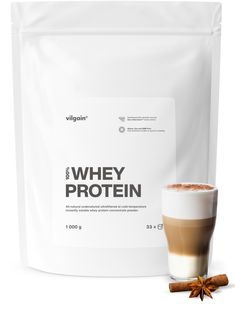

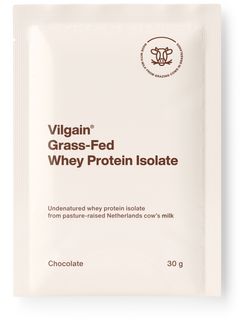



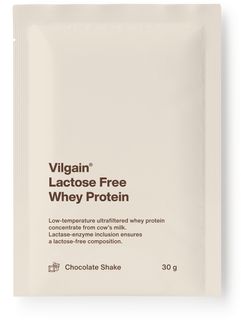

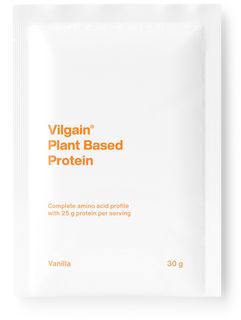

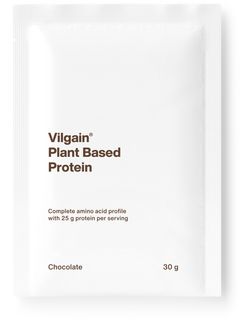
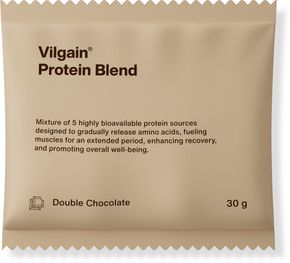
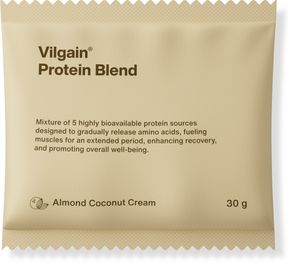

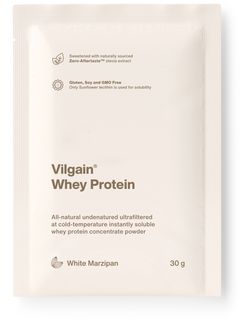
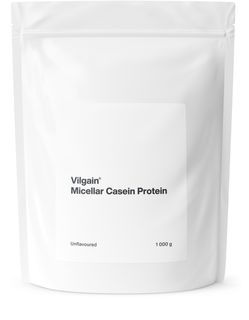
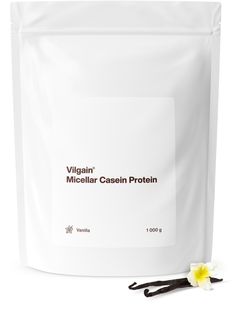
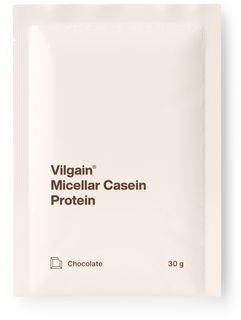
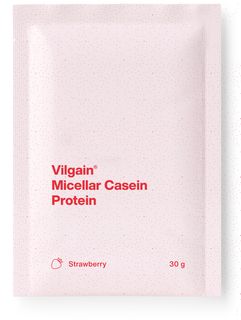
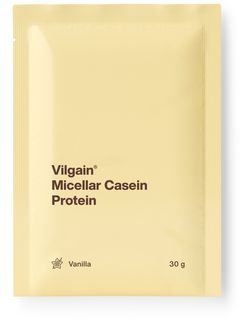
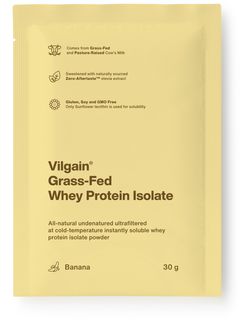
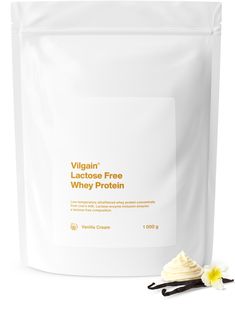
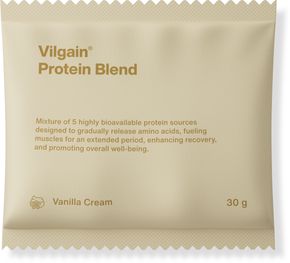

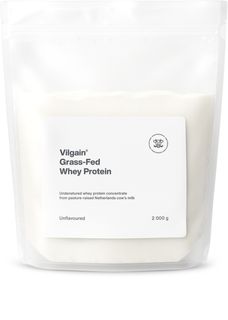



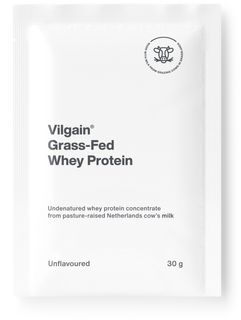

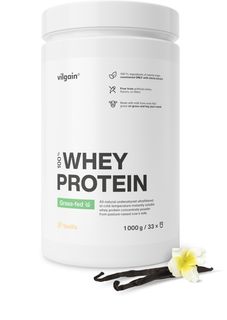





Protein powders and protein drinks
Protein is the basic building block of all cells and tissues, consisting of amino acids. In the human body, it performs a number of functions, e.g. building, transport, regulatory or protective. Together with fats and carbohydrates, it is one of the basic macronutrients whose adequate intake should primarily be ensured by a varied diet.
In sports nutrition, however, protein refers to a food supplement (usually in powder form) that contains at least 70 % protein. Protein powder is used to easily replenish protein in the human body, regardless of the current fitness goal.
What is protein good for?
Adequate protein intake is important for the proper functioning of the entire body. It becomes even more important when trying to lose weight, gain muscle mass or engage in more physical activity. Protein intake:
- helps maintain muscle mass,
- supports metabolic function,
- promotes regeneration,
- reduces hunger,
- promotes bone health.
Proteins 101 or choosing a protein for beginners
A protein supplement can be chosen based on several criteria. One of the most important factors determining the quality of a protein is its origin. In this respect, two basic sources can be distinguished - animal and vegetable.
Animal protein
Animal protein is considered to be a better quality type of protein, mainly due to its better usability and protein quality, which is due to the complex spectrum of essential amino acids. Animal proteins can be further divided into:
- Milk protein represents only a small part of cow's milk, which can be used in food processing to enrich products with protein or as a stand‑alone protein preparation. It consists of casein (80 %) and whey (20 %).
- Whey protein contains 70‑95 % protein and is one of the highest quality and most popular protein sources ever. It is available in three different forms - concentrate, isolate, hydrolysate - which differ in production method, content and properties. Whey protein is one of the fastest digesting protein sources, which makes it suitable for post‑workout.
- Whey concentrate is a versatile protein supplement with an unbeatable price/performance ratio. It is the most popular protein on the market, which has a better taste thanks to the proportion of fats and sugars.
- Whey isolate is characterised by its high protein content and low fat and lactose content - so it can also be suitable for lactose intolerant individuals.
- Whey hydrolysate or hydro, is an enzymatically cleaved protein that is more easily absorbed and supplies muscle tissue more quickly. Its disadvantage is its high price.
- Casein protein on the other hand, belongs to the group of slowly digestible proteins. It usually contains 70‑80 % protein and increases the concentration of amino acids in the blood for a longer period of time. Its properties make it particularly popular in the late evening (hence the name night protein).
- Egg protein can be purchased in two different forms - liquid or dried. Dried egg whites contain around 80 % protein, while liquid egg whites contain only 10%. Their advantage is the almost negligible amount of carbohydrates and fat, but the significant disadvantage is the taste.
- Beef protein contains up to 90 % protein, and although it is an animal protein, its usefulness for building muscle mass is low compared to whey protein. It contains fewer essential amino acids, which are a major factor in stimulating muscle protein formation.
- Insect protein represents the future of nutrition for many people. And with a protein content of up to 90%, zero carbohydrates and a significant proportion of healthy fats, they are very much in favour.
Multi‑ingredient protein is a special type in which several proteins with different digestion rates are combined, so that the muscles are supplied with protein over a longer period of time. The usual combination is a mix of whey protein (most often concentrate and isolate) and casein protein, but the addition of egg or other protein is no exception.
Vegetable protein
Plant proteins are a less valuable alternative to animal proteins, due to the absence of a comprehensive spectrum of amino acids - some amino acids are less represented and some are missing altogether (can be addressed by amino acid supplements). Due to the absence of the animal component, they are often referred to as vegan proteins. They are therefore also suitable for individuals with cow's milk protein allergy or lactose intolerance. The most common and best vegetable proteins include:
- Soy protein is the most commonly used plant protein, which has comparable effects to animal proteins, but its dosage should be increased. Care should be taken when consuming high levels (more than 60 g per day) as it can cause digestive problems.
- Hemp protein is currently one of the most popular plant proteins, as are most other hemp products. However, in terms of muscle building and strength development, it is not one of the highest quality.
- Pea protein is one of the highest quality plant proteins. It is rich in fibre content and also leucine, as the amino acid with the highest anabolic potential.
Due to the incomplete amino acid spectrum of individual plant sources, plant proteins are often combined to increase their utility. One of the best combinations is pea‑rice protein, which we also use in our Plant Based Protein.
Quality brands
With protein supplements, you will come across a number of labels indicating the quality of the protein. The most common are CFM, Grass‑Fed or native protein:
- CFM proteins refer to proteins produced using cross‑flow filtration technology, which is nowadays typical for almost all whey proteins;
- Grass‑Fed proteins are produced from the milk of free‑range grass‑fed cows, which gives them a more favourable fatty acid composition and thus the highest quality proteins. You can sample from our range Grass‑Fed Whey Protein or Grass‑Fed Whey Protein Isolate;
- fresh milk is used to produce native proteins, not the "waste" whey that is a by‑product of the dairy industry. This is a protein of high quality as well as price.
Proteins by flavour
It will be a protein evergreen in the form of vanilla, chocolate, banana a strawberries or something unconventional? Protein flavours have exploded in recent years and there's nothing stopping you from enjoying a protein drink like the popular pumpkin spice latte, blueberry cheesecake or chai latte.
It has a versatile use in this respect flavourless protein which contains no additives and is 100% pure. It can be flavoured with freeze‑dried powder, cocoa or other ingredients.
However, it is advisable to check the origin of all flavours - are they synthetic or high quality natural colours and flavours? Fortunately, the era of cheap substitutes is slowly becoming a thing of the past, but it is still advisable to check the ingredients of each protein.
When and how to use protein?
Protein is most often taken around training (in this case, it is ideal to mix protein with water) along with other substances that enhance physical performance, help with recovery and subsequent muscle growth. However, protein drinks can be drunk at any time of the day (even in combination with milk) to supplement total protein intake. Find out more in this article, in which we explain, when to drink protein.
A protein shake is just one of the many uses for protein powder. It can also be used in cooking, baking, making smoothies, pancakes or even making homemade ice cream. You can get inspiration for dishes with protein at Aktin recipes.
How much protein to take per day?
The recommended daily protein intake depends on your age, gender, level of physical activity, amount of muscle mass, fitness goals and overall health. General recommendations include:
| dietary minimum | 0,8‑1 g/kg body weight |
| endurance athletes | 1,4‑2 g/kg |
| reduction diet | 1,4‑2 g/kg |
| gaining muscle mass | 1,6‑2.2 g/kg |
The need for increased protein intake is also found in pregnant women or seniors who are experiencing a loss of muscle mass in the body. In the long term, it is advisable for protein supplements to form a smaller part of the daily protein intake. A varied diet should always be the basis. Read more in this article, in which we comprehensively discuss daily protein intake.
Which supplement to take if I want the best...
...protein for weight loss?
A sufficient (increased) protein intake is essential when trying to lose weight - protein will boost the metabolic rate, prevent muscle loss and has the highest satiating power of all macronutrients. From this point of view, almost all proteins can be considered as suitable supplements in weight loss efforts.
For its low sugar and fat content, whey isolate appears to be the best supplement. It is also worth trying some supplements directly designed for weight loss - e.g. Vilgain Diet Whey which is also enriched with natural extracts to support weight loss.
...protein for muscle growth?
Protein is the building block of every muscle fibre, and even when trying to build muscle, increased protein intake cannot be avoided. In terms of price/performance ratio, the best protein is whey protein, which easily and quickly replenishes protein at any time of the day.
Protein can be added to the diet by "a 'night‑time' casein protein which is characterised by slow absorption and prevents muscle catabolism during the night. Caloric excess is also important when gaining weight and muscle, which can be helped by protein‑carbohydrate gainer.
...protein for baking?
Desserts, desserts and other treats are an ideal way to incorporate additional protein into a "boring" eating routine. But the problem comes right away when choosing the right protein. Anyone who has ever baked with a classic protein knows that if handled carelessly, protein clumps easily and the resulting product is rarely soft and fluffy. For these reasons, we have developed a unique baking protein that will not disappoint any cook.
Other protein dietary supplements
Protein powder or R2D protein drink are not the only dietary supplements that help with adequate protein intake. If you're sick of protein in liquid form, you can try other sources of quality protein:
If you don't know which protein to reach for, visit our magazine for advice how to choose the right protein. If you're looking for guaranteed quality, try our Vilgain proteins that are 100% naturally sourced.


